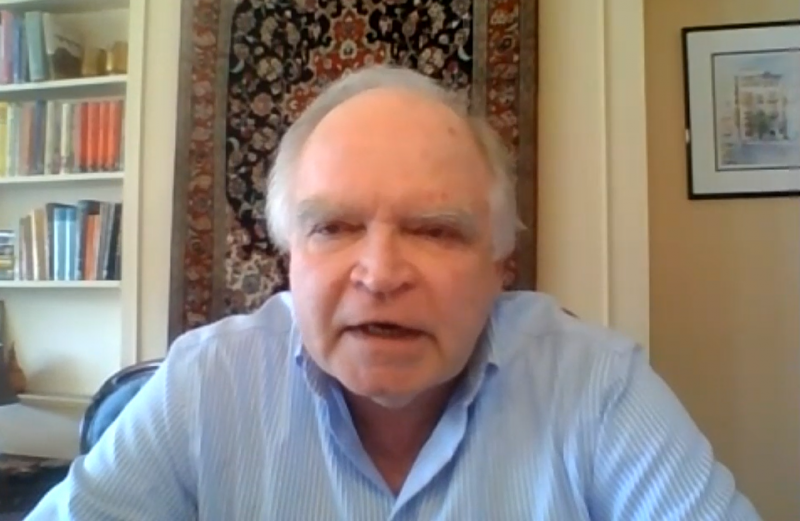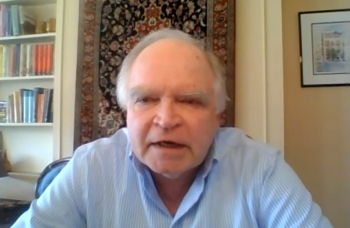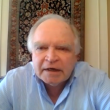Southport’s Paul Zalucky helps find pathways for Ukrainian refugees
Southport resident Paul Zalucky is working behind the scenes to create pathways for refugees fleeing Ukraine. The retired Central Intelligence Agency executive worked international relations in Eastern Europe and the Middle East with much of his time spent in Poland and Ukraine. In his retirement, Zalucky still has an office in Warsaw, Poland where, except for the duration of the pandemic, he regularly visits for business as a private consultant for Ukrainian and U.S. cyber-security firms.
Zalucky's family is native to western Ukraine and throughout World War II, moved around Central Europe for survival. At the end of the war, Zalucky's parents journeyed from one of the refugee camps to Ellis Island and eventually settled into Chicago's Ukrainian Village.
“One of the reasons I joined the Agency was to maybe give back to the country that gave us so much,” Zalucky said in a Zoom interview with the Boothbay Register March 10. Now, one of the ways Zalucky is giving back is by employing the same American ideals of liberty and freedom that saved his family from post-World War II Soviet crackdowns.
“We are now in the process of just trying to help the families that are there. I still have family in western Ukraine. They've moved out of the city and basically settled into an area which they think will hopefully remain outside the sphere of Russian bombs and missiles. We've had some friends who are also business partners (and) we've also helped them get their families out to Warsaw.”
Zalucky and his circle are well connected to several of the Ukraine government’s ministries which have become key to getting people out. They have also had an open line with Poland’s Ministry of the Interior which controls the border guards and they have mustered Polish railways to assist with moving humanitarian supplies beyond the border.
Thanks to mobile apps like Signal – a service providing end-to-end encryption for text, video, voice, photos and files – connecting with families is not as difficult as originally feared which has helped with shelter exfiltration missions, said Zalucky. Most telecommunications are still active with lapses of one to three days depending on location. The heavy steel and concrete bomb shelters make it difficult for incoming or outgoing signals, he said.
While there are many families choosing to stay due to Ukraine's emergency policy retaining all men from ages 18 to 60 for potential combat, Zalucky said evacuation is still critical and the option to accept help is always on the table up to the last minute. Zalucky said one of his cousins has a son in his 30s who is married and has two children – if the women and children leave, they have no way of knowing if they will see each other again. “It's a traumatic emotional experience for them to make that decision … Is he going to be drafted? Is he going to go to war? Will he survive? These are difficult emotional stresses for all of them.”
Zalucky said he also has a cyber-specialist friend who decided to stay behind and help the government with cyber security. “He said, 'I'm not leaving. This is my city, my capitol and I'll die here if I have to.' It's a decision most people don't have to make and that's the way they feel about it. That's why I think the Russians will not hold Ukraine. They can create a mess, they'll want chaos, but they won't hold any of those cities.”
While President Vladimir Putin and Russian leadership appear dumbfounded Ukraine was not brought to its knees in the first hours of its invasion, Russian soldiers at the battlefront seem equally as upset they were not greeted with flowers as liberators, Zalucky said. Most of the Russian army is conscripted, or drafted, tours are 18 months to two years, soldiers cannot spend the last six months of their tour in a combat zone and conscripts are not supposed to spend time in combat zones at all, he said.
“This is a web of lies by Putin and his entourage,” Zalucky said. “Many (Russian soldiers) said they had no idea where they were going, what they were doing. They've been deployed a long time even since November and doing training on the borders … and they thought they would all go home. That's when they launched their invasion of Ukraine.”
Initial reports showed outdated Russian weaponry, with battalions often found struggling to maintain three or four generations of tanks, and the convoys only had three to five days of fuel and supplies, said Zalucky. The entire operation, run on $5 billion decade-long preparations, was only supposed to take one to three days, he said.
With a demoralized front, Russia has resorted to its only means of pushing forward without meaningful boots on the ground, he said: shell the cities into submission. Despite Russian Foreign Minister Sergei Lavrov’s dismissal of “pathetic shrieks” that civilians are being targeted, Zalucky said all evidence points to the contrary.
“It's from my understanding … that most attacks now are coming from rockets and cruise missiles and artillery barrages against civilian targets … They don't seem to be able to make much progress on the ground with their military, so what they thought they'd do is create chaos and panic among the local population by indiscriminately leveling cities.”
The chaos and panic might be ever present, but Ukrainians’ resolve seems to prevail. Despite calls for a no-fly zone and emergency entry to the European Union and NATO, Ukrainians are adamant they can fight their own war, a stance that will probably not change, said Zalucky. President Volodymyr Zalenskyy and his military are focusing on securing Ukraine’s access to weapons and arms to defend themselves and, in that way, the West has come through, he said. Over a dozen EU countries and the United States have supplied military aid.
If Ukraine’s claims to have neutralized several high level Russian officers are true and reports that the Russian military is not using secure communications are correct, then that likely means Ukraine is being fed high quality intelligence from the U.S. and United Kingdom, said Zalucky. Add to that Ukraine’s surprising ability thus far to down Russian aircraft with shoulder-mounted Javelin and NLAW missiles, its biggest need is an air defense system, he said.
“Israel has Iron Dome, we have our Patriot missiles, so there's something between that. I know the Brits have provided an air defense system … I imagine in the field of intelligence, given my background, there's probably a very robust exchange between the U.S., the Brits and the Ukrainians on what is happening on the battlefield.”
Zalucky said social media is becoming key in the battle for information and the war for the hearts and minds. Ukrainians with relatives in Russia have been sharing information on the invasion and Russians simply do not believe it, he said. So, Ukraine's biggest initiative is to get the nearly 3 million Russian diaspora across the world to get in touch with family in Russia to let them know about the situation. With Russia cutting its people off digitally from the outside world, absolute censorship is not possible especially with Anonymous taking down or defacing Russian websites. “I think the one crucial difference is that ... they will have to put two and two together (about) all the difficult sanctions that are now being imposed on them ... They're now getting hit. Mastercard and Visa are now shutting services, the banks are closed. Now, the actual middle class and all Russians are starting to feel the pain and I think will start asking questions why is this happening now, it never happened before. The ideal would be a regime change in Moscow. That can happen not very soon, but eventually I think that's the only way this war in Ukraine will end.”
Zalucky said given its trouble waging war on the ground, Russia has yet to launch any meaningful part of its air force. Speculation as to why includes a lack of confidence in air force technology and the fact that Ukraine has been successful with its small and determined defense force, he said. Other than Russia’s success with long-range artillery, Zalucky said there are more rumors, some of which turned out true since this interview, that Russia will soon be bolstered by additional armed forces. Chechen leader Ramzan Kadyrov and his military are aiding Russia's push into Kyiv and Putin is rumored to have deployed the Wagner Group in reconnaissance missions to assassinate Zalenskyy, said Zalucky. The Wagner Group is a Russian Blackwater-style mercenary company which has been active since 2014 and has operated in various conflicts across South America and Africa and most notably in Crimea and Syria.
Putin’s reliance on people like Kadyrov and the Wagner Group is more evidence of a shortsighted campaign to take over Ukraine, said Zalucky. Russia’s lack of success on the battlefront is also not a ruse and not part of any long game tactics, he said.
“I think he is a tactician, (but) I think he's responding to his emotions, now … This is a very different Putin from even 10 years ago … This comes down to simply holding onto power. He is in charge, he has nothing to show for his rule so far other than the period when he was first in power … organization and control to the Russian people after the chaos of the initial dissolution of the Soviet Union. Now, I think he feels threatened to have a neighbor so close, so large and significant that is looking to Europe.”
Ukraine has had five elections since 1991 having never reelected a president, one of the tests for a successful democracy, said Zalucky. Ukrainian culture and business interests are also moving West and that almost certainly stokes fear in a struggling Russia which, without its former Soviet bloc nations, is “just another country with nuclear weapons.”
“Putin is being threatened by a thriving democracy with a growing economy where I think, for the first time, the standard of living is higher than it is in Russia for the average person. That's unheard of for Russians to think Ukrainians have a better standard of living. I think for him, it's about having a state that he can't control that's moving on its own because that may ultimately infect the population of Russia.”
With rumors Putin intends on reinstalling the impeached and exiled former President Viktor Yanukovych, Ukrainians will enter a “war of attrition” and if Russia succeeds in taking Kyiv, Ukrainians will not concede defeat, Zalucky said. A country of 40 million and Kyiv a city of nearly three million, Putin’s misjudgment on Ukraine’s post-Soviet sentiments is becoming costly. Ukrainians have now been traveling freely to other European countries for years to live and work. “That's changed their look and I think Putin is not aware of that … What I'm worried about is a situation like the Spanish Civil War, the fascists versus the communists. Here, it would be the people for freedom and liberty and democracy versus the autocrats.”
Zalucky said the best weapon against the World War III scenario is going to be resolve against Putin especially if the conflict deescalates and negotiations begin. “The U.S. and the West have to be very firm … on these sanctions and take nothing less than complete withdrawal of Russian troops to the pre-February 24 order. If that doesn't happen, it will all break loose into fights all around the world at that point.”
If the West falters by loosening sanctions or refusing to clamp down on Russia, would Iran feel emboldened enough to go to war with Israel, North Korea with South Korea, or China with Taiwan, asked Zalucky. Russia is trying to change the post-WWII order and any success in that direction puts “all of that on the table,” he said.
At this point, Western resolve seems to prevail and most of Ukraine’s neighbors stand in solidarity accepting refugees in every way they can, said Zalucky. Refugee centers in Poland opened late due to an outpouring of sympathy from Poles who initially invited families into their homes, he said. However, two weeks on, Ukraine’s mass exodus is wearing the aid thin and refugees’ needs are growing for things like food, water, diapers, cots, beds, tents, sleeping bags, blankets and medical supplies. The best way to ensure those needs are met will be through funding, said Zalucky.
“People in Poland, Hungary and Romania are able to use those funds and purchase supplies in Europe and bring them in. In bigger cases, we can get equipment that might be provided here by major hospital chains and things like that and then organize a transport into Ukraine … At this point, it's a question of survival.”
Zalucky said anyone willing to support Ukrainian refugees should consider Operation Palyanytsya, a Committee for Open Democracy project at helpukraine22.org
























